
Why The U.S. Economy is Facing Challenges in 2025
Understanding the Current State of the US Economy
As new or beginner traders, staying informed about the economy is essential to your trading success. Right now, the U.S. economy is facing some significant challenges in 2025, and it’s crucial to grasp how these issues can affect your trading strategies. As we dive into the topic of high inflation and increased interest rates, you’ll see how these factors could impact your investments and the stock market overall.
High Inflation: What Does It Mean?
High inflation means that the prices of goods and services are going up. When you go to the store, you might notice that your favorite snacks cost more than they used to. This increase in prices can affect how people spend their money. If people have to pay more for everyday items, they might have less money to spend on other things, like new gadgets or clothes. For traders, this is important to consider because decreased consumer spending can lead to lower sales for companies, which might cause their stock prices to drop.
Rising Interest Rates: Why It Matters
Another factor affecting the U.S. economy is rising interest rates. When interest rates go up, it costs more to borrow money. This means that if you want to buy a house or a car, your monthly payments might be higher than before. For businesses, higher borrowing costs can make it tougher to invest in new projects or expand. As a trader, this is a key point to watch. If companies struggle due to high interest rates, you might see their stock prices fluctuate. Understanding this link between interest rates and stock values can help you make more informed trading decisions.
Lingering Supply Chain Issues
You might have heard about supply chain issues over the last few years. These problems occur when goods can’t be delivered on time to stores or manufacturers, and they can lead to delays in production. Some ongoing supply chain challenges are still affecting the U.S. economy. This can cause shortages and further drive up prices, leading to even higher inflation. For a trader, knowing which companies are experiencing these supply chain issues can help you choose your investments more wisely.
Consumer Spending: A Silver Lining?
Despite all these challenges, there is a note of optimism. Some experts point out that consumer spending has remained resilient. This means that even with high prices and higher interest rates, people are still buying. For traders, this is a positive sign. If consumer spending keeps up, it might help companies maintain their profits and keep their stock prices stable or even growing.
As you think like a trader, pay attention to how consumers respond to economic challenges. Their spending habits can give you clues on what sectors of the market could do well even when things seem tough.
The Job Market: A Double-Edged Sword
There’s a cautionary note regarding the job market as well. Experts warn there could be job cuts in key industries. If people start losing jobs, their confidence in the economy can drop. This might lead to decreased consumer spending, which we discussed earlier. For traders, this could mean potential downturns in certain stocks. Keeping an eye on employment rates and industry news can help you anticipate market movements.
Trading Strategies in a Challenging Economy
- Stay Informed: Make it a habit to read financial news, reports, and articles about the economy. For example, following updates on inflation trends and interest rates can provide critical insights.
- Diversify Your Portfolio: In uncertain times, it’s smart to invest in various industries and assets. If one sector struggles, another may thrive.
- Watch Consumer Trends: Keep an eye on spending patterns. If consumers are still spending despite inflation, consider investing in retail stocks or consumer goods.
- Practice Risk Management: Use stop-loss orders to protect your investments. This way, you can manage potential losses during market volatility.
As you dip your toes into the trading waters, remember that the challenges facing the U.S. economy in 2025—like high inflation and rising interest rates—are important factors to consider. These issues can have a significant impact on stock performance. Stay informed, observe consumer spending, and think about how job market trends can affect your investments.
If you want to shortcut your learning curve and achieve quick results, consider joining our trading course. You’ll gain insights and techniques that can help you navigate these economic challenges effectively.
Don’t forget to subscribe to our email list for the latest updates and follow us on social media. Join us on Facebook, Instagram, TikTok, and Pinterest.
Together, let’s embrace the opportunities and tackle the challenges that lie ahead in trading!
Source: Yahoo Finance









2 Comments
Pingback:
Pingback: